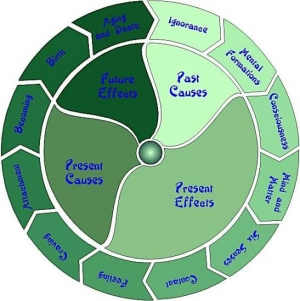The Law of Dependent Origination
Pratītya Samutpāda
(Dependent Origination)
The theory of Dependent Origination (Pratītya Samutpāda; Pāli: paticca-samuppāda), which literally means “arising on the ground of a preceding cause,”
could well be considered the common denominator of all Buddhist traditions throughout the world, whether Theravāda, Mahāyāna, or Vajrayāna.
The canonical texts of the Theravada tradition portray Śāriputra (the Buddha’s disciple) as saying that
whoever understands Dependent Origination understands the teaching of the Buddha, and whoever understands the teaching of the Buddha understands Dependent Origination
.
In the Vajrayāna tradition, a similar view is expressed by the 14th Dalai Lama (1935- ) who stated in his 1990 book, Freedom in Exile, that:
the fundamental precept of Buddhism is this law of Dependent Origination.
No matter what the tradition, one can clearly see the importance attributed to the theory:
It renders it a fundamental tenet of Buddhism, indispensable for realizing and understanding the implications of Buddhist philosophy.
The theory of Dependent Origination is usually divided into 12 links (nidāna), each of which conditions the following link.
The 12 links of the chain of Dependent Origination:
(1) Past
1. Ignorance
2. Karmic activities
(2) Present
3. Consciousness
4. Mind and matter
5. Six sense-doors
6. Contact
7. Sensation
8. Craving
9. Attachment
10. Becoming
(3) Future
11. Birth; rebirth
12. Old age, death
The order presented above is traditionally referred to as the normal order (anuloma), which illustrates the process of the development of Saṁsāra.
The pratītya-samutpāda is also often presented soteriologically in reverse order (pratiloma), which simply indicates that if one link is eradicated, the next is also eradicated.
The chain of Dependent Origination is often approached as a causal theory. One usually speaks of causality when one says “there being this, that appears:”
Yet it is necessary to stress that a substantial “cause” from which the “effect” was generated cannot be deduced from Dependent Origination.
The Saṁyutta nikāya (Connected Discourses) explains that fertile soil, water, and light are necessary conditions for the growth of a sapling, but none of these factors alone will yield the expected result:
Similarly, each of the links of the chain of Dependent Origination is necessary for the production of the next element, yet none can definitely be perceived as sufficient on its own.
Since this complex chain of causation is always said to give rise to suffering, the deactivation of any of the 12 links of this chain is bound to break the causal process and to eliminate suffering.
According to the Pāli canon, both the chain of Dependent Origination and the 5 Skandha (Aggregate) are responsible for suffering:
The Buddha stated repeatedly that the root of all suffering lies in the 5 aggregates, which represent the psychophysical constituents of the individual.
This is further evidenced by the Mahāvagga of the Aṅguttara-nikāya (Discourses Increasing by One), where an intimate relation between the 5 aggregates and the theory of Dependent Origination is established:
In this specific discourse, a description of the Four Noble Truths is offered in terms of Dependent Origination:
Therein, the First Noble Truth follows the standard canonical rendering and ends with the following phrase: “in short, the 5 aggregates are suffering” (A. i, 177).
Yet the description of the 2 following Truths does not comply with the paradigmatic rendition. Instead, they are depicted in terms of the theory of Dependent Origination.
The Noble Truth concerned with the Arising Of Suffering is simply explained by the pratītya-samutpāda in normal order (anuloma), while the Noble Truth of Cessation of Suffering is defined by Dependent Origination in reverse order (pratiloma).
It is clear then that Dependent Origination, traditionally seen as an explanation for the arising and the eradication of suffering, is intimately related to the theory of the 5 aggregates.
The Theravada tradition holds that certain links of the chain of causation are limited either to the past, present, or future. In other words, and as illustrated above, different links constitute different temporal divisions.
Although this chronological division is not expressed explicitly in the Pāli canonical literature itself, it is supported by the Abhidhammattha-saṅgaha (Compendium of Philosophy) of Anuruddha, a South Indian Buddhist philosopher (ca. 11-12th century C.E.).
